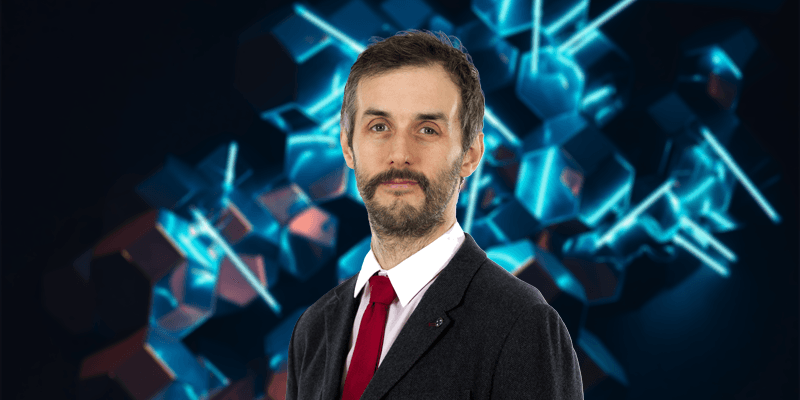Pinsent Masons technical lead talks all things AI
 “I studied engineering at university and decided I didn’t want to be an engineer – but I liked being a student, so I went back and did a Master’s degree. This was all around the time that the internet showed up on the scene, so I knew I wanted to do something related to technology”, recounts Jason Barnes, low code development technical lead at Pinsent Masons.
“I studied engineering at university and decided I didn’t want to be an engineer – but I liked being a student, so I went back and did a Master’s degree. This was all around the time that the internet showed up on the scene, so I knew I wanted to do something related to technology”, recounts Jason Barnes, low code development technical lead at Pinsent Masons.
Barnes joined the firm before it became Pinsent Masons, originally planning to work for a year or two as he thought up an idea for a PhD. But starting off in a general IT position, he was soon able to get involved in designing databases, often for niche legal work, something he found to be “quite good fun”. Subsequently, web applications came along, and that provided another avenue of interest. “I knew straightaway that this was what interested me, so I effectively became a web application developer. We started building web applications for clients and lawyers, and were met with a good degree of success, so we did more work and our team grew”, says Barnes.
Re-evaluating his career trajectory some years later, Barnes decided to move away from a full-on development role to explore the product management side of things. “In short, this involved looking at how software solutions can be implemented to make things easier for people and businesses”. But missing the creativity of being a developer, Barnes started to get involved with no code/low code tools, such as the Microsoft Power platforms, which came on to the market in a big way a couple of years ago. “I got quite excited with these and was convinced that this was a significant technology direction for us as a firm. Nobody else was spearheading this within Pinsent Masons, so I decided to — now I head up our low code team and am back to being a developer!”
Responding to a question about his day-to-day, Barnes chuckles, saying, “most of the time I have to be stopped — I really do like my job!” He explains that low code tools are designed for non-developers to use and build applications.
“At professional firms, you’ve got, say, a large mass of lawyers who are lawyering and need solutions to help them do this. Now, you can go out to the market to buy these solutions, but for bigger, innovative firms, you want to do this yourself, so you can build exactly what you want. Now, a law firm will only have a certain number of developers, and even they can only do so much when everyone at the firm has an idea they want to see developed. Low code tools can step in and help those people with the ideas to do the development themselves, without having to wait for the developers to do it. So essentially, we’ve got lawyers building robots, although they might not always realise that that’s what they’re doing”.
Barnes sees this as a form of empowerment — with low code tools allowing lawyers to take charge of automating processes and eliminating the frustration of having to wait around for developers to take charge. He does point out, however, that while one can achieve quite a lot with these tools, there’s still some elements that are difficult to navigate, which is where his job steps in, as technical lead of low code development. “We’re there to help the people who have the ideas turn their ideas into solutions”, he summarises.
What’s the typical process through which AI is developed at a law firm like Pinsent Masons? “Despite having worked in technology my whole life, I still always start things off with a pen and paper. If you can’t draw what you want you want to build, then you’re not going to be able to build it”, he responds. Barnes also notes that while lawyers are usually great at articulating what it is they want to build, representing this in a diagrammatic form is often challenging. However, this is at the core of the developer mindset, so we can help with that”, he explains.
Barnes also speaks about the main challenges posed by artificial intelligence (AI) in the legal industry, and he points out that “very few people have a clear understanding of what we mean when we talk about AI”. With the vast majority of people building their views on what they see in the media, most exposure is to generative AI, such as ChatGPT — but that’s only one part of what AI actually is. When I talked earlier about a lawyer having an idea to automate a process, that’s also AI. It’s a computer system doing what a human would normally do. So, one of the challenges is really understanding what it is we’re talking about in the first place”, he explains.
“One of the things at the forefront of everyone’s mind is the protection of client data”, Barnes continues, on the topic of challenges associated with AI in law. “As law firms, nothing matters more than the integrity of our clients’ data — everybody is conscious of the risk of having large language models trained on data sets comprised of client data without prior client agreement”, he notes. On the flipside, Barnes notes that the greatest opportunity for AI in the legal industry is in reimagining the everyday, and taking the monotonous tasks off lawyers hands, so that they are freed up to tap into their human intelligence, to provide better legal services for clients. He offers up document extraction as a tangible example of where AI can have application.
Approaching the end of our conversation, Barnes offers his views on the ‘are lawyers going to be replaced by robots’ debate. “Part of me thinks, well yeah”, he laughs. “A lot of the work I do is around innovation, driving up quality and lowering the cost base. So, taking that to its logical conclusion, we could be looking at a world where we do things artificially across all industries and save a lot of money. But I don’t think anyone wants that”, observes Barnes. While quantifying things in terms of processes and diagrams is easy, and might foretell an automated future, he notes that this ignores the human element of interpersonal relationships which is crucial in the legal space. “I don’t think legal work can be reduced to a collection of ones and zeros”, he concludes.
About Legal Cheek Careers posts.


